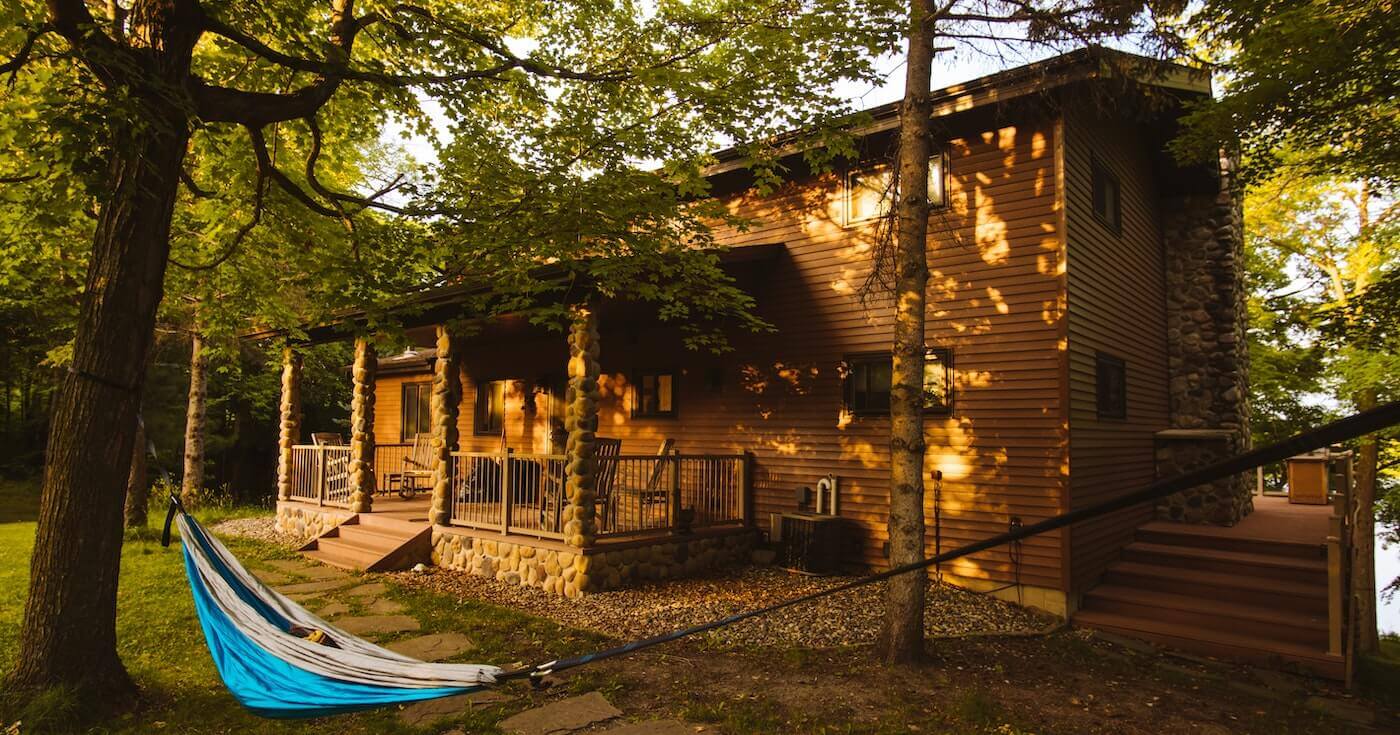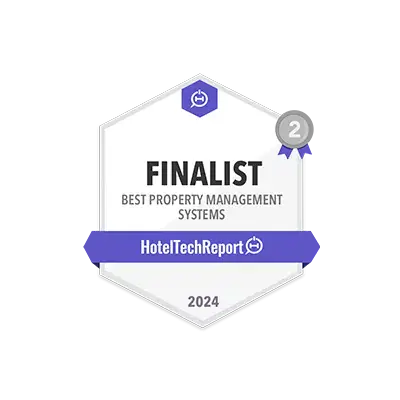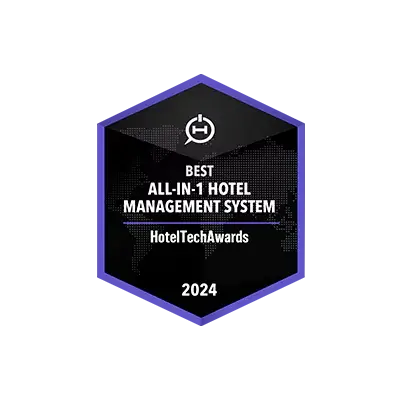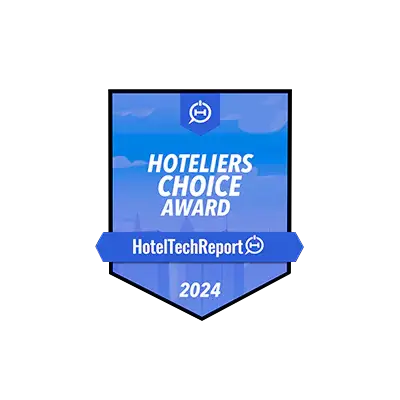
By Cloudbeds
The eco/green/environmentally friendly movement has become popular and shows no sign of stopping. Many travelers are knowledgeable about green hotel certifications that vouch for such practices in hospitality, and their decision between booking one property over another depends on eco-friendliness.
This trend is borne from the statistics. 90% of consumers look for sustainable options when traveling, and 73% are more likely to choose an accommodation with sustainable practices. Lodging operators are taking note, with 74% having already implemented some form of sustainable practice at their property.
Certifications are a great place to start if you’re looking for ways to be more sustainable at your property. There are many types of certifications varying from no cost to high cost. TripAdvisor, for example, offers a free certification based on a survey. Most certifications cost money because they require third-party auditors to visit properties. Third-party auditors conduct a full analysis of environmental practices.
Keep in mind that each certification has its own associated costs. Those certifications that require in-person visits or frequent follow-ups will be far more expensive than some of the programs offered by smaller associations and companies. Of course, that cost can more than makeup for itself thanks to the added cachet from globally-recognized certifications. It comes down to your property and what makes sense for your brand.
The ideal result of any eco-certification is not only protecting the environment but also boosting your profile among like-minded travelers. As you select your certifications, prioritize those that can give you that added visibility among potential guests!
What is a green hotel?
A green hotel, also known as a sustainable hotel or an eco-hotel, prioritizes sustainability across its operations. Within that definition of a green hotel, there’s a broad spectrum of differing approaches.
On one end, we have hotels built from the ground up with sustainability in mind. These eco-hotels will have considered sustainability at the design phase, building the property in such a way that minimizes its impact on the environment. Sustainable building practices will be environmentally friendly, using less energy and wasting fewer raw materials during the construction process. The completed property will incorporate fixtures and technologies that promote waste management, energy savings, and water preservation, like solar power and water recycling systems. Given the effort and expense required, these hotels usually earn a certification recognizing the property’s sustainability. (We’ll cover the most common global hotel certifications below).
On the other end of the sustainability spectrum, we have existing hotels that update their practices and properties to be more environmentally friendly. These green hotels may not necessarily have followed sustainable building practices but operate the properties with an eye toward sustainability. This can include features like capturing and reusing rainwater, low-flow toilets, and LED lighting, as well as programs like encouraging guests to launder towels and bedding less often during their stay.
How do l make my hotel green?
There are many ways to establish your hotel’s green credentials. Of course, some are better than others. The worst thing you can do is pay superficial lip service to green your hotel, only to be called out for greenwashing — the term for companies that promote inflated green credentials without making meaningful changes.
In general, you’ll need to consider things like:
- Improving your property’s sustainability includes water usage, energy efficiency, and waste management.
- Maximizing the social and economic benefits for your community.
- Reducing negative environmental impacts.
- Assess the sustainability of your supply chain, as this will reflect on your hotel in any certification process.
The best route for making your hotel green is to first decide on which certification(s) you’d like to pursue. Since each eco-hotel certification has its own requirements, this ensures that you take the steps necessary to qualify. Otherwise, you risk investing resources in things that won’t help you gain the valuable certification that boosts your credibility in the eyes of eco-conscious travelers.

Hotel eco-certifications: Global
LEED.
LEED is a program that recognizes properties built from the ground up with sustainable practices. Given that it only applies to new properties, this won’t be relevant for everyone. However, if you are in the middle of a significant rebuild, it’s worthwhile to look at the LEED certification standards to see if it’s worth qualifying. It’s a significant credential that highlights your green bonafides to sustainability-minded travelers!
LEED offers four levels of certification. The number of points determines the level. Certified 40-49 points, Silver 50-59, Gold 60-79, and Platinum 80+ points. LEED certification is recognized across the globe as the premier mark of achievement in green building. This interactive LEED discovery tool will guide you through the decision-making process. And, while it’s a program based in the United States, any property can pursue certification: 44% of square footage pursuing LEED certification is outside the US.
Green Globe.
The Green Globe Certification not only measures the environmental, social, and economic sustainability of the business itself but also its supply chain partners. Using 44 core criteria and 380+ compliance indicators, this holistic 360-degree assessment makes Green Globe one of the most thorough eco certifications for green hotels worldwide.
The Green Globe Certification also has three certification levels, so even if your hotel is at the earliest stages of its sustainability journey, you can still participate in the program. Green Globe uses third-party auditors to conduct a fair analysis of your property. Green Globe offers certification and training to help properties be as environmentally friendly as possible.
TripAdvisor Green Leaders.
GreenLeaders was created to recognize green hotels and B&Bs with environmentally-friendly practices. The benefit is in a special callout on your property’s profile: A GreenLeader logo is displayed prominently to showcase your commitment to the environment. The program considers things like linen reuse programs, energy usage tracking, recycling, energy-efficient light fixtures, wastewater treatment, electric charging stations, and more.
The Green Leaders badge appears on qualifying properties’ profiles, adding an easy marketing boost among a key group of guests.
There are four badge levels, bronze, silver, gold, and platinum, each corresponding to a different level of commitment to sustainable practices. The certification is free and based on a survey completed by the hotel. So it’s a no-brainer! Even if your hotel only meets the bronze requirements, the badge can boost your visibility and credibility among TripAdvisor users.
Green Key Global.
Green Key Global is an environmental certification body for hotels and meetings. As more corporations consider their carbon footprint and environmental impact, the certification is ideally suited for hotels with a strong meetings business.
With a strong focus on North and South America, Green Key uses an “Eco-Rating” to grade hotels. This graduated rating system awards 1-5 keys based on their level of compliance with the program. 5 keys is the highest rating. After an initial award is given, the property will receive guidance on how to maintain and improve its key level. Assessment is based on sustainable practices throughout the operation, including energy and water conservation, waste and environmental management, indoor air quality, community outreach, building infrastructure and land use.
Green Tourism Active.
GTA Global, which has been recognized by the GSTC, offers on-site verifications for its certification. These assessments cover sustainable practices around energy usage, water conservation, sustainable procurement, cultural conservation, staff practices, and others.
GTA has four levels of certification, Green Initiate (35% pass rate), Green Leader (60% pass rate), Green Champion (80% pass rate), and Green Champion with Distinction (90% pass rate). The organization is not-for-profit, so its certifications are often more accessible to smaller properties and independents.
Audubon Green Lodging Program.
Audubon International, a global non-profit focused on environmental education and sustainable management of natural resources, also certifies hospitality properties. The Audubon Green Lodging Program provides third-party verification of hotel properties that meet a specific set of environmental standards, with a strong focus on water quality, resource conservation, waste minimization, and energy efficiency.
The certification has four stages: Self-Evaluation, where you learn best practices and submit an official application; Assessment, where staff reviews and verifies your application; Verification, when an independent auditor assesses your property; Eco-Rating, where you get your certification and suggestions for continued improvement. Annual fees are based on the number of rooms and years in the program, starting at $250 for properties with up to 50 rooms.
Green Seal.
Green Seal is a nonprofit organization that uses science-based programs to empower consumers, purchasers, and companies to create a more sustainable world. Green Seal Certification is a rigorous process that includes annual compliance monitoring and a commitment to continuous improvement.
Hotels and Lodging certification include three levels: bronze, silver, and gold. The assessment evaluates performance around waste minimization, energy conservation, water management, preventing pollution, and environmentally sensitive purchasing. The fee for bronze certification starts at $1,950 and increases per tier (bronze, silver, gold) and room size.
EarthCheck.
In operation since 1987, EarthCheck is a massive global organization that provides a basket of consulting, software, and certification services. Becoming EarthCheck-certified is a rigorous process covering all types of accommodations, from small lodges and serviced apartments to the largest resorts. The assessment includes a broad array of criteria, from energy efficiency, land use planning, air quality protection, waste management, greenhouse gas emissions, and social and cultural management. To see one hotel chain’s experience, check out how EarthCheck certified Melia Hotels International.
Certification also comes with an in-built marketing advantage from the EarthCheck name: journalists use it as a filter to identify truly sustainable hotels. EarthCheck’s reach is truly global, certifying organizations in over 70 countries.
Travelife.
Travelife is an international sustainability certification scheme and has been approved by the Global Sustainable Tourism Council. The award is based on an evaluation of sustainability management systems, environmental Management, labor and human rights, and community integration from both a supplier and customer perspective.
All Travelife-certified hotels and accommodations must undertake an independent on-site audit to receive the award. Properties can receive one of two awards, either the Travelife Gold award or the Travelife Award of Excellence, and must be audited every two years to maintain their award.
Hotel eco-certifications: Europe
Green Tourism (United Kingdom).
Green Tourism has certified over 2,000 members in the UK, Ireland, and Canada. The criteria are divided into ten areas, which then expand into 150 different criteria.
Ecotourism Ireland Certification Programme (Ireland).
The Sustainable Travel Ireland certification complies with the GSTC standards and External Auditors and an assessment committee to award certification. There are three levels of certification, from bronze to gold.
Ecolabel or Eco Flower (EU).
The Ecolabel program identifies products that are sustainable and eco-friendly. While this is not directly a certification for hotels, it is something to look for properties based in the European Union. By using products with this label, you’ll more easily align with other certification standards.
Hotel eco-certifications: The Americas
Energy Star (United States).
Energy Star aims to create environmental benefits and financial value through exceptional energy efficiency. Energy Star rates businesses based on a score of 1-100. The Portfolio Manager tracking tool helps businesses (like hotels) to benchmark their performance to others. It’s free to all users and is a great way to identify a property’s energy effectiveness.
Certification for Sustainable Tourism (Central America).
Initially created in Costa Rica to manage tourism in a more sustainable fashion, this certification has become more broadly adopted across Central America. Learn more about the CST certification(information in Spanish.)
GREAT Green Deal Certification Program (Central America).
One of the top 20 certification programs in the world, the Great Deal certification is designed for every hospitality property size and type, as well as travel companies such as tour operators, transport providers, restaurants, etc.
Sistema de Distinción en Turismo Sustenatable (Chile).
The Chilean government has created this distinction system for sustainable tourism in the country. The certification orients around economic, social, cultural, and environmental standards, which are broken down into 57 evaluation criteria. Qualifying accommodations can earn three different levels of distinction.
Hoteles + Verdes (Argentina).
With the “Hoteles Más Verdes” certification, which complies with Global Sustainable Tourism Council standards, Argentinian hotels can earn three different levels of certification, bronze, silver, or gold.
Hotel eco-certifications: Africa
Fair Trade Tourism (Southern Africa).
This nonprofit organization certifies businesses in South Africa, Madagascar, Mozambique, and Zimbabwe. It also has reciprocal relationships with certification programs in Namibia, Seychelles, Botswana, Kenya, and Tanzania. Benchmark criteria include fair wages and working conditions, fair purchasing and operations, equitable distribution of benefits, and respect for human rights, culture, and the environment.
Ecotourism Kenya.
The goal of the certification is to promote tourism practices that preserve cultural heritage and conserve natural resources. Its Eco-rating Certification assesses performance against criteria around environmental, economic, and social-cultural benchmarks.
Green Star Hotel (Egypt).
Created by the Egyptian hotel association, with the support of the Egyptian Ministry of Tourism, the Green Star Hotel Certificate monitors members’ environmental management practices, as well as how it operates its food and beverage, features, and guest experience.
Hotel eco-certifications: APAC
Eco Certification (Australia).
The Eco Certification program certifies tours, accommodations, and attractions that focus on nature. There are three levels of certification: nature tourism, ecotourism, and advanced ecotourism. For Australian businesses considering the certification, there’s also a handy assessment tool to see how close your business is already certified.
Asian Eco-tourism Standard for Accommodations.
The AESA was formally recognized by the GSTC accreditation panel in 2019 and focuses on eco-lodges, eco-resorts, and nature-based lodges in the APAC region. There’s a free self-assessment tool to see if your property qualifies.
Which eco-certification is right for your property?
The certifications listed above are not appropriate for all types of properties. But, there is a green solution out there for any property willing to put in the time and effort.
Large Independent Chains:
- TripAdvisor GreenLeaders
- Greenkey
- Green Globe
- ENERGY STAR
- Green Seal
- Audubon
- LEED (new properties or renovations only)
- Green Tourism (the UK and Canada)
Bed and Breakfasts:
- TripAdvisor GreenLeaders
- Greenkey
- ENERGY STAR
- Audubon
- LEED (new properties or renovations only)
- Green Tourism (the UK and Canada)
Independents/Hostels:
- TripAdvisor GreenLeaders
- ENERGY STAR
- Audubon
- LEED (new properties or renovations only)
- Green Tourism (the UK and Canada)
Many of these certifications offer extensive case studies outlining the positive effects of implementing eco-friendly practices. Obtaining a certification, especially one completed by a third-party auditor, will help confirm your team’s efforts, as well as convince guests your eco-claims are valid.
Once you narrow down your options to a few certifications, ask for references and research each organization’s credibility. You want to balance the thoroughness of the certification with its visibility among the types of guests who use sustainability when deciding where to stay.

















